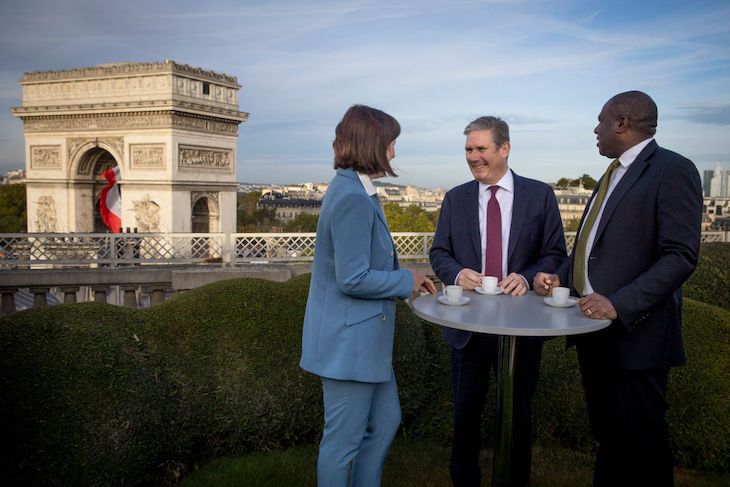The left-wing French newspaper Le Monde last month sent its London correspondent across Great Britain to gauge the mood before the general election. He reported that Britain was ‘a broken nation’, and its people ‘glum and divided’. Britain is not in the best of shape, a point on which the people and its politicians are agreed. So the Tories have been booted out and it’s Keir Starmer’s responsibility to try and reinvigorate the country.
The transition was achieved calmly, peacefully, democratically, with the only dramatic incident of note the day a silly young woman desperate for attention threw a milkshake at Nigel Farage.
If Britain is ‘broken’, then what is France?
Across the Channel, France is in the midst of its own parliamentary election – and it is a contest devoid of calm, peace and democracy. On Thursday, it was announced that 30,000 police and gendarmes will flood the streets on Sunday when the results of the second round are issued. Nearly 3,000 will be on duty in Paris, mostly around the National Assembly, to prevent an attack on the building.
Antifa has called for a ‘convergence’ on the National Assembly on Sunday evening, and few in France are under any illusion as to what that means. As Marine Le Pen remarked: ‘The French far-left’s version of the ‘assault on the Capitol’…Is Emmanuel Macron still sure he wants to get them elected?’
This was a reference to the decision of Macron’s Renaissance party this week to form a temporary coalition with the left – which includes a candidate who is a senior member of an organisation called the Jeune Garde, a splinter group of Antifa.
Antifa have been much in the news this week. On Monday, several of their activists allegedly assaulted a National Rally candidate as he campaigned in Cherbourg; and on Wednesday, it was disclosed that eight members of the Jeune Garde have been charged with assaulting a Jewish boy in the Paris Metro. According to Le Monde, the 15-year-old was ‘beaten and forced to chant “Long live Palestine” in front of the activists, who filmed him.’
There have been other repugnant episodes this week. In Grenoble, a 77-year-old man was assaulted – allegedly by a supporter of Jean-Luc Melenchon’s far-left la France Insoumise – as he put up posters for Macron’s Renaissance party. In the Parisian suburb of Meudon, two female MPs from Macron’s party were set upon by a group of 20 youths.
The man responsible for the febrile state of France is president Macron. It was he who called the snap election on 9 June, a petulant response to the hammering his party had taken in the European elections. They had been trounced by the National Rally, which took nearly one third of the vote, more than twice the score of any other party.
‘I’ve heard your message, your concerns, and I won’t leave them unanswered,’ Macron told the nation in his address. ‘I have confidence in our democracy, in letting the sovereign people have their say.’
The sovereign people repeated the same message in the first round of the parliamentary election last Sunday. The National Rally again took a third of the vote, well clear of the left-wing coalition and far ahead of Macron’s centrist alliance. In a healthy democracy, this would have been the moment the ruling elite accepted the will of the people and allowed the second round to run its course.
But Macron’s France is not a healthy democracy. It is a sick one, and so the president has cobbled together an alliance of centrists, communists, socialists, centre-right chancers, environmental radicals and Hamas sympathisers in an attempt to thwart the will of the people.
The latest poll indicates that it won’t be enough to prevent the National Rally winning the most seats, but the unholy alliance should stop Le Pen’s party gaining an absolute majority in the National Assembly.
What then will happen? Macron will invite his coalition to form a government, one very much under his watchful eye with a prime minister of his choosing.
Macron may imagine he has pulled off a master-stroke in snatching the keys to government from Le Pen. All he has done, in fact, is make it more likely she will win the presidential election in 2027. The next three years will be turbulent, and Le Pen will be able to look on from the sidelines at the political chaos created by Macron and his centrist cronies.
Meanwhile, the prospect of three more years of Macron alarms many within his own party. His behaviour is becoming increasingly erratic. Last weekend he and his wife took the air at Le Touquet in northern France, strolling along the sea-front without a care in the world. ‘It’s mind-boggling,’ confided one of his inner circle to the media. ‘What a denial of reality.’
Macron has always appeared a little detached from the reality of France. That’s because he doesn’t know France. For the ‘president of the rich’, France is the 16th arrondissement of Paris: where the apartments are big, the pavements clean and the people prosperous. He has no understanding of what life is like in the provinces or the inner cities. And frankly he doesn’t want to understand.
On Wednesday in Paris, a thousand or so left-wing supporters assembled in the Place de la Republique for an evening of singing, dancing and speeches. I stopped by to soak up the atmosphere. It was rather jolly.
In the centre of the Place de la Republique is a nine-metre statue of Marianne, the embodiment of the French Republic, who holds in her hand an olive branch. The graffiti that has been daubed on the statue in recent weeks does not promote goodwill: threats against policemen, National Rally voters, conservative broadcasters and Israel.
If Britain is ‘broken’, then what is France? It is also broken, and on the brink.








Comments